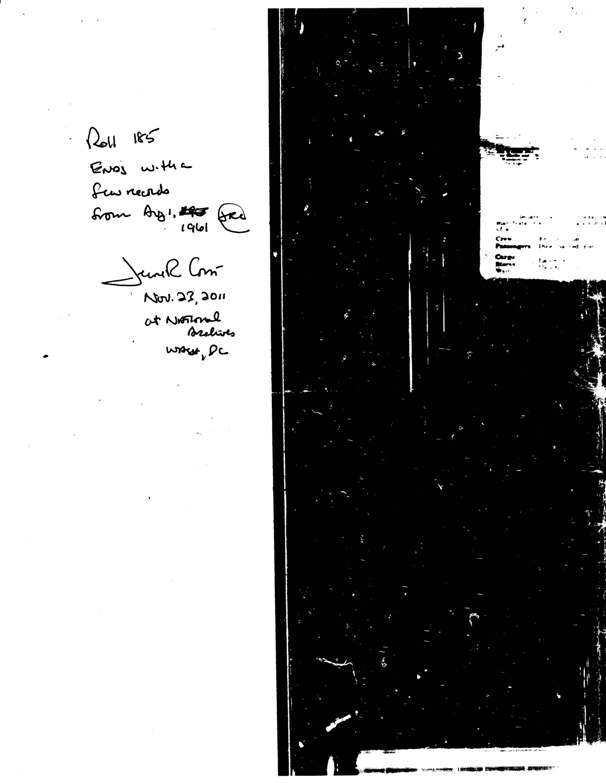Immigration records missing for week of Obama's birth
Arpaio's team probing possibility president born abroad
By Jerome R. Corsi
WND.com
After months of searching, investigators commissioned by Maricopa County, Ariz., Sheriff Joe Arpaio to examine Barack Obama’s eligibility for office found Immigration and Naturalization Service travel records for foreign flights into Hawaii in 1961, only to discover that records for the week of Obama’s birth were missing.
Investigators were searching to determine if Barack Obama might have been born in a foreign country and returned to Honolulu in or around August 1961 with his mother, Ann Dunham.
Arpaio’s team looked at databases in the National Archives and Records Administration with microfilm of INS passenger records for foreign flights arriving in Honolulu and New York City.
If Obama was not born in Hawaii, as he and the Hawaii Department of Health have been insisting, there should be INS passenger cards that the new mother filled out for herself and her infant son upon arrival in Honolulu from a Pacific Rim city or arrival in New York City from across the Atlantic.
Arpaio launched the investigation after being presented with a petition signed by 250 members of the Surprise Tea Party in Surprise, Ariz. He authorized a volunteer Cold Case Posse of former law enforcement officers and detectives in October 2011 to examine the authenticity of Obama’s long-form birth certificate and to determine Obama’s eligibility to be president under Article 2, Section 1 of the Constitution.
Before he was first elected Maricopa County sheriff in 1993, Arpaio spent 25 years with the Drug Enforcement Administration, including service as DEA regional director in Mexico City and special agent in charge in Phoenix. He is running for re-election to his sixth term as Maricopa County sheriff.
As WND reported, Arpaio’s team found probable cause that the document presented one year ago as Barack Obama’s birth certificate is a forgery. WND reported yesterday that Arpaio asked Selective Service Director Lawrence Romo in a letter to produce original documentation of Obama’s Selective Service registration, noting his team’s finding that there is probable cause that it, too, was forged.
Microfilm examined
After INS passenger records for foreign flights entering the U.S. through Hawaii in a database identified as “A3573″ were found, Arpaio’s investigators found a second database, designated as “A3998,” with comparable INS records for foreign flights arriving at New York City’s Idlewild Airport.
One complication was that the National Archives and Records Administration, or NARA, held only the original microfilm records for INS 1961 airline passenger record. Since the original microfilm records were often the only existing copies of the passenger manifests, NARA would not permit them to be viewed by researchers. The intent was to protect the originals from being scratched or damaged, especially by placing them on a microfilm reel or copier.
Finally, NARA agreed to produce microfilm copies of 24 reels of records for the time period from July 1961 through September 1961.
Subsequently, 28 microfilm reels from A3998 records of INS passenger cards for foreign flights arriving at New York’s Idlewild Airport in August 1961 were copied by NARA and made available for examination at the National Archives in Washington, D.C.
Read the preliminary findings of Sheriff Arpaio’s Cold Case Posse investigation.
To date, researchers are waiting for the additional 1961 records for both datasets to be copied by NARA and made available for inspection at the National Archives.
Obama birth-week records missing
Investigators examining the microfilm records found only one week of INS passenger cards to be completely missing in all the records so far examined.
In some sequences of cards, the records were blurred or overlapped each other, obscuring the data.
Specifically, in Record Group A 3573, data records for Aug. 2, 1961 through Aug. 7, 1961, appear to be completely missing, as if the records were removed from the database prior to the microfilm recording.
Exhibit A shows NARA Record Group A3573, Reel 184, for INS passenger records on foreign flights into Honolulu from July 28, 1961 through Aug. 7, 1961.
Exhibit B shows NARA Record Group A3573, Reel 185, INS passenger records on foreign flights into Honolulu from Aug. 8 through Aug. 12, 1961.
Remarkably, all INS records for the week of Obama’s birth, Aug. 1 through Aug. 7, 1961, were missing from the end of Reel 184 and were not discovered anywhere on Reel 185 or any other microfilm reel in the record group.
Exhibit C is a Photostat printout of what the end of Reel 184 looks like.
While the printout is only partial, what can be observed is one of the two or three INS cards in the records from Aug. 1, 1961. The reel ends with about 10 inches of white blurs and black space, without any other records from Aug. 1 to Aug. 7, 1961, despite the written documentation to the contrary on the microfilm reel’s box.
NARA explains
In a series of emails beginning Nov. 21, 2011, investigators notified NARA archive reference specialists of the missing dates. NARA specialists in Washington, D.C., checked with the NARA employees in College Park, Md., who had made the duplicate microfilm reels for public inspection.
College Park NARA officials found the INS passenger records in Record Group A3573, Reels 184 and 185, were also missing in the original microfilm reels. No INS original paper documents could be found for 1961.
At the request of investigators, NARA archivists documented the missing records in a two-page letter. The first page of the letter can be viewed here and the second page here.
In the Feb. 6 letter, Brenda Beasley Kepley, chief of NARA’s Archives 1 Processing Section, acknowledged that passenger records for Record Group A3573, Rolls 184 and 185, covering the period July 28 through Aug. 12, 1961, had been filmed by the INS in August 1961, and the original paper records were not retained.
Kepley acknowledged that the records for the period Aug. 2 through Aug. 7, 1961, were missing. She argued that the missing data was due to poor quality control that allowed multiple cards to be fed through a document feeder and become bunched together, obscuring the images underneath.
“Apparently no quality control was done at the time of filming to check for these errors,” Kepley wrote. “Consequently, it is difficult to determine whether or not images of cards for the period August 2 through August 7 exist on Roll 184. If they do, they are unreadable.”
The Maricopa County Sheriff’s Office ordered and obtained duplicate microfilm of Rolls 184 and 185 to be placed into evidence.
Investigators examining both microfilm rolls determined that the 10 inches of microfilm filled by white blurs and blank space would have been a fraction of the microfilm inches needed had records been intact for all foreign flights arriving in Honolulu Aug. 2 through Aug. 7, 1961.
While a few bunched records are observed at the end of Reel 184, investigators did not find evidence of the volume of INS passenger record cards that would have been present had the records been microfilmed.
The bunching up of several hundred INS passenger card records for the dozens of flights arriving in Hawaii Aug. 2 through Aug. 7, 1961 would have constituted a major collapse in the document feeding mechanism that could not possibly have gone unnoticed by the microfilm technicians making the archive record from the physical paper copies.
MCSO investigators concluded that the NARA explanation of bunched up and overlapping records caused by a defective document feeder was not a credible explanation for what was observed on the two microfilm reels.
Reel 185 begins with Aug. 8, 1961, with minimal and expected blank lead microfilm and with no trace of bunched or overlapping records from previous dates.
Instead, MCSO investigators have concluded that the INS passenger records for the dates Aug. 2 – Aug. 7, 1961 are missing from NARA Record Group A3575 for reasons that remain unexplained.
MCSO investigators are currently waiting for NARA to duplicate the remaining 1961 INS passenger cards in both record groups for subsequent inspection at the National Archives in Washington, D.C.
Editor’s Note: Arpaio’s team authorized WND’s Jerome Corsi to examine the INS documents at the National Archives.






